(Folks, forgive me for my professional dishonesty. This week, I am only copying and pasting an article that I wrote for my online newspaper. If I had not written the article, I would have surely blogged on this subject.
In Quetta, the city where I live and work, a suicide bomb blast on Friday killed around seventy people and injured two hundred civilians.
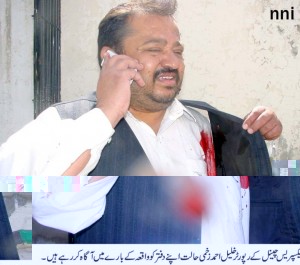
Some eight journalist friends of mine received injuries while covering the blast. The driver of a TV team was killed. I am badly depressed over the carnage. Some of these journalist friends have been hospitalized many times before while covering terrorist activities. You can enlarge the pictures simply by clicking on them.
You may not be able to read the Urdu captions of the photos so I have put captions for you in English. All these journalists were injured previously in a similar suicide bomb blast in a Quetta hospital. I admire their courage as you can see them still talking on the phone to report to their respective newsrooms.)
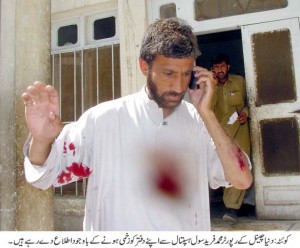
The title of this column will surely disappoint the brave journalists who cover wars and deadly conflicts. It also comes as a let-down to the aspiring journalists interested in war reporting. Western journalists do contribute to the bulk of war correspondents but their conditions still drastically vary from the circumstances reporters in Balochistan and Khyber Pashtunkhawa provinces of Pakistan face. The controversial concept of “embedded journalism”, which has radically undermined many correspondents’ credibility, has in fact improved the working conditions of western war reporters.
I truly believe Balochistan and Khyber Pashtunkhawa are currently more difficult to report from than even many of the war-zones in the world. Let me explain:
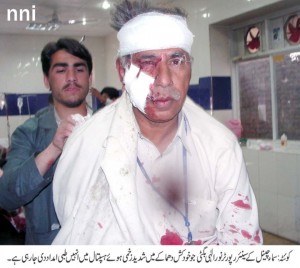
At least eight professional reporters and news cameramen were injured the other day in Quetta while performing their professional duty when a suicide bomb blast killed around seventy people. Mohammad Sarwar, the injured driver of Aaj TV team was killed in the blast. Sadly, we underestimate Sarwar’s sacrifice because he does not qualify as a “professional journalist” under our definition of a journalist. Yet, he was also killed while chasing the “breaking news”. Our DSNGs [ Digital Satellite News Gathering] will not reach on the newsy spot without professionally committed people like Sarwar. With an indolent Sarwar, even the best of the reporters will lose the race before the rival media outlets.
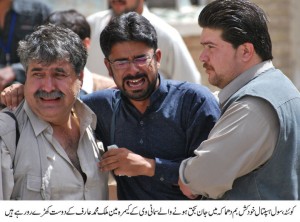
I know all these committed journalists of Balochistan who were injured in Friday’s blast. I have been lucky enough to work with these brave men for the past many years. I have no qualms in admitting that they are far braver than I am. Take Noor Ellahi Bugti of Samma TV, for example. It was barely four months ago I had visited him in Quetta’s Combined Military Hospital (CMH) nursing his wounds. Bugti had gone to Quetta’s civil hospital to cover the murder of a Shia Banker on April 18 along with his team. As Bugti began to report for his channel live from the hospital, a suicide bomber blew him up there. Luckily, Bugti escaped the attack with serious injuries, his cameraman, Malik Arif, was killed in the blast.
While eight journalists were badly injured in the hospital blast, newspapers showed the gallant reporters the next day reporting to their television channels in spite of blood streaming from their heads and other parts of body.
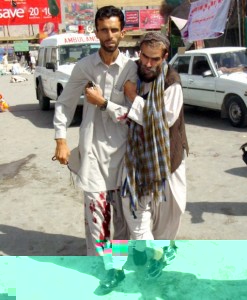
Earlier this year on July 26-27, I spent two days in Islamabad’s Holiday Inn Hotel with a select group of national and international journalists to discuss the safety issues faced by journalists in all four provinces of Pakistan. Organized by the International Federation of Journalists (IFJ) and the Pakistan Federal Union of Journalists (PFUJ), the two-day deliberations were attended by PFUJ President Shaukat Pervez, Secretary General Shams-ul-Islam Naz, former PFUJ Secretary General Mazhar Abbass, Karachi Union of Journalists Secretary General, Syed Hassan Abbass, Peshawar Press Club president Shamim Shahid, Khyber Union of Journalists President Ibrahim Shinwari and three international media and security experts.
Pondering over the state of the press in all four provinces, one learned that the dynamics of news search in Pakistan had dramatically changed after the liberalization of media and upsurge of suicide bombings in the country. Nowhere in Pakistan are journalists, press photographers and cameramen provided proper safety training. The onus lies on the owners of these media houses to prioritize imparting of safety training to their staff before sending them to the field.
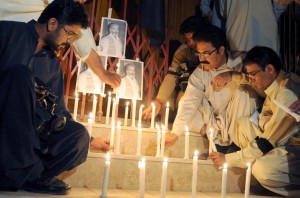
The “breaking news syndrome” in electronic media does not only lead to regular breach of journalistic ethics but also endangers the lives of reporters on duty. Media professionals sometimes end up violating their mandate while trying to storm into an operation theater or a restricted place only to get the “big story”. I liked HART security specialist Paul Jorden’s suggestion that cameramen could stay safe and still capture the “big story” while utilizing maximum capability of the zoom lenses.
Likewise, the lives of many injured journalists can be saved if media teams are trained how to use first-aid kits. It was disappointing to learn that the government of Pakistan has obstructed the PFUJ from acquiring bulletproof jackets for the journalists. With much hardship, the PFUJ managed to acquire some jackets for the journalists but the Interior Ministry is unwilling to hand them over to the journalists as if they pose a serious threat to the national security.
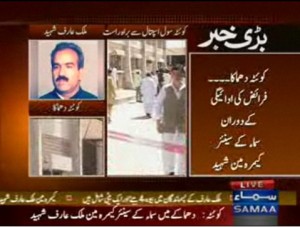
As luck would have it, blasts take place every day and we have to cover them every time. We journalists are a very strange people. While rest of the world runs away from a catestrophie, bomb blast, earthquake or a flood, we want to be the first ones to reach there. Journalism is all about passion and love for story-telling. I know it is impossible to dissuade reporters to cover conflicts, what we urgently need is proper training how to minimize, if not eliminate, the risks involved in conflict reporting.
Media owners, who are notorious for not implementing the Wage Board Award and issuing appointment letters to their employees, would view us as slave drivers if we ask them to induct insurance policy for their workers. I know this is asking “too much” from the proprietors of the media outlets; yet it is too small a contribution to honor the sacrifice journalists made by putting their lives in danger every day.
I sincerely hope that the a proposed safety guideline booklet being prepared by PFUJ and IFJ for the journalists of Pakistan after the two-day long working group meeting in Islamabad will be released soon. The safety booklet should be followed by training of journalists across the country, particularly in Balochistan and Khyber Pashtunkhawa where several journalists have been killed in the recent times while covering the conflict.


Good report! Life is difficult and sufferings! How many blood you give for democracy?
I never thought about safety training for journalists. Thank you for opening my eyes!